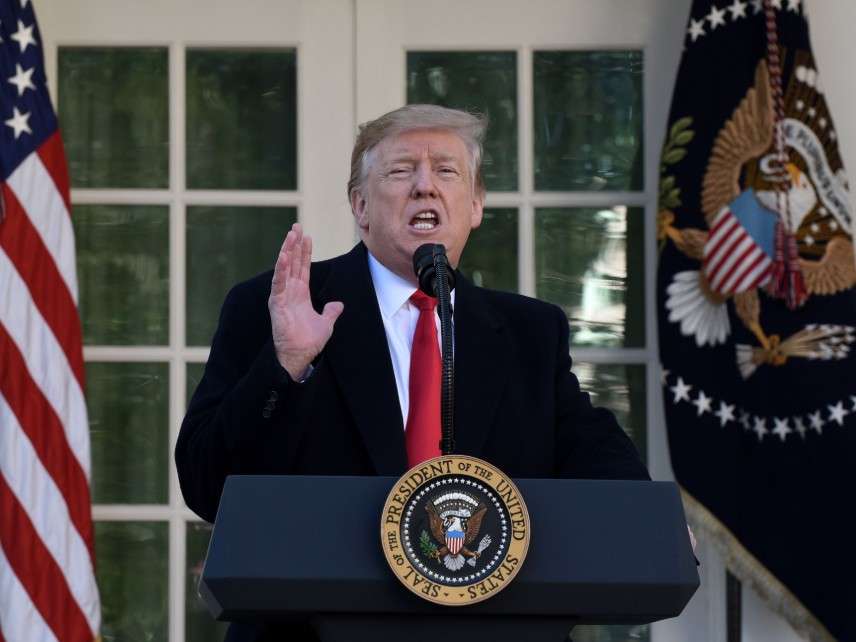The Shutdown Was a Failure on Its Own Terms
It will leave us with a bigger, more powerful, and more fragile federal government.

The main thing we learned from the partial government shutdown that ended last week was something that was apparent before it started: Shutdowns don't work.
President Donald Trump's decision—and it was almost exclusively his decision—to shut down the government to pressure congressional Democrats into supporting a border wall was an abject failure on its own terms. It was also a clear defeat for anyone who favors a smaller, more limited government. If anything, it left us with a federal government that is slightly larger and more powerful than it was before.
Judged strictly as a tactic for extracting policy concessions, the ploy came up short. Although Trump spent most of the shutdown insisting that he would not accept any deal to reopen the government that did not include $5.7 billion for the construction of a barrier along the southern border, he caved in the end; the deal he accepted to reopen the government for three weeks included no significant concessions from Democrats
That's a huge defeat for a president who campaigned on an anti-immigration platform while touting his ability as a tough-minded dealmaker. Trump was simply outplayed by House Speaker Nancy Pelosi, who understood how the shutdown would play out. Trump didn't, and by handing her an early win he has has empowered his primary political antagonist.
Pelosi is an effective political strategist, but the outcome in this case is less a result of some sort of unique genius on her part and more a product of Trump's incompetence and impetuousness. It was obvious from the beginning that Trump would lose, because Trump, who declared in December that he would be "proud to shut down the government for border security," was the one attempting to extract policy concessions by forcing a shutdown.
The clear lesson of past shutdowns is that this tactic not only fails, it backfires. When Republicans, led by Sen. Ted Cruz of Texas, shut down the government over Obamacare in 2013, the health law briefly became more popular and Republicans folded in a matter of weeks. At the beginning of last year, Democrats briefly shut down the government over immigration demands; they folded when it became clear the public was against them. Attaching unrelated demands to a budget negotiation is a losing strategy.
This shutdown gave us the same essential dynamic, with the general public blaming Trump by a large margin (which seems fair, given that he said he was responsible) and even the president's core supporters trickling away as time went on. In the end, Trump gave in and got nothing in return. Anyone with a cursory knowledge of recent political history could have predicted that this was how it would play out. But apparently, that category does not include Donald Trump.
To be clear, I'm glad we won't end up with a wall. It's a bad idea based on bad premises, and it simply doesn't reflect the reality of immigration in the United States. But that doesn't mean the shutdown had no consequences.
For starters, it probably cost taxpayers money. Federal workers who went without paychecks will receive back pay. Federal contractors will be paid with interest. The economy probably suffered as a result of the shutdown, with an estimate from the Committee For a Responsible Federal Budget putting the toll at around $26 billion. The Congressional Budget Office estimated the cost to the economy at around $11 billion, though much of that will be recouped over time. At a press conference today, Larry Kudlow, Trump's top economic adviser, disputed the figure while offering no evidence to the contrary.
If there is a legislative outcome from this, meanwhile, it's likely to be a bill to pay federal workers during shutdowns. A number of Senate Republicans have come out in favor of such legislation, with Sen. Rob Portman (R–Ohio) touting a bill that would continue to fund federal agencies at existing levels should lawmakers fail to reach a budget deal, allowing for small reductions over time in order to encourage legislators to act. This would effectively put the budgets of federal agencies and the paychecks of federal workers on autopilot, like so much other federal spending.
And while we won't be getting a border wall, we may well end up with Trump declaring a state of emergency and trying to build a wall without legislative approval. Trump toyed with that idea during the shutdown, and in his remarks last Friday he all but announced his intention to use it when the current three-week deal is up if Democrats don't approve wall funding. At this point, it's fairly obvious they won't.
Any declaration of emergency by the president would almost certainly end up in court, and the challenge would probably last years, rendering it practically useless, at least in the short term. Yet declaring an emergency in this circumstance would still represent an executive power grab—a formal indication that Trump has no problems thwarting the will of Congress if doing so suits his political goals.
The final result of this shutdown, then, will probably be a government that costs taxpayers more, in which the paychecks of federal workers become permanently sacrosanct, with the stage set for the president to make a symbolic play to further expand executive power.
This result is all the worse because it was so predictable. No good was ever likely to come from this shutdown, and now that it is over (at least temporarily), it's clear that no good came of it.


Show Comments (126)